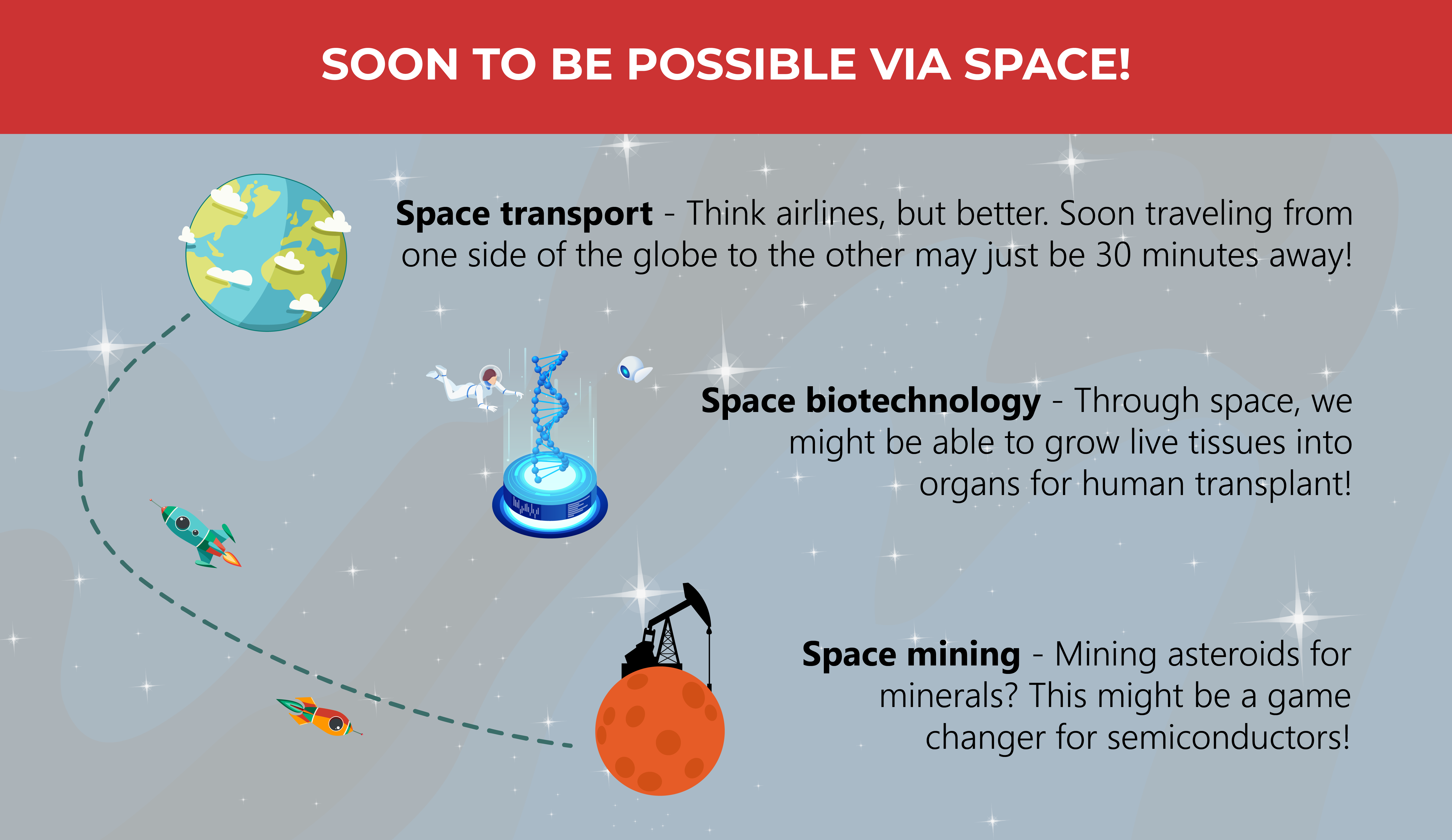Stars Shine Bright for the Space Economy

Sorry, Captain Kirk. Space is not the final frontier. It’s only the beginning. The space economy is about to go supernova, and we’re here for what it has in store for our planet Earth.
When we think of outer space, we tend to imagine rocket ships and astronauts, alien life forms, and landing on the moon. We now know that space exploration is a reality, what with companies such as Space X, and space tourism already selling out tickets to the elite. However, there’s more to space than exploration and more to space economy than just tourism.
(Also read: Space Tourism: A Primer for 2022)
Space economy refers to all economic activities and business ventures enabled through space. Tourism is but a small component of it. Many sectors contribute to the space economy today such as telecommunications, broadcasting, broadband, GPS, and weather management, as well as emerging industries such as space transport, space manufacturing, and space mining. Even medical and other scientific industries have a stake in the space economy.
Currently, the stars are aligning for the space economy in 2022. This year has been all about seeing promising business prospects, new policies, emerging players, and exciting innovations in this fast-expanding industrial arena.
Space has now grown to become an industry worth $249B, up by 9% from 2021. Today, corporate and government investments are keenly focused on space ventures, with India emerging as a new key player in the arena, following hot in the heels of the United States and China.
The Space Foundation’s recent report on the space economy shows that there was significant growth in 2021 with space-based products and services such as broadband and GPS. A non-profit organization founded and based in the United States that focuses on education advocacy about the space industry, The Space Foundation has noted that the growth experienced by the space economy is the fastest its ever had since 2014.
There were 75 rocket launches from all over the planet in the first half of 2021. Not since 1967’s space race between the U.S. and the Soviet Union has there been such a frenetic pace in launching rockets into space. The report goes on to show that 90% of more than a thousand rocket launches in 2022 were supported by commercial firms such as Space X, which launched 39 Starlink internet satellites this year.

New Players on the Space Scene Rise
With a 22% share in the global space industry, India is quickly becoming a key player in the growth of the space economy. A nation of scientists and engineers, India’s nurturing environment for tech start-ups and space infrastructure is helping the country rise as facilitators and drivers in the space sector.
The country launched its first dedicated commercial satellite, GSAT-24 in June 2022, and in the same month, Prime Minister Narendra Modi inaugurated the headquarters of IN-SPACe (Indian National Space Promotion and Authorisation Centre).
IN-SPACe recognizes that India can contribute to the space economy through the country’s human resources, capital expenditure, and expertise. Data, information, knowledge, and wisdom were key pillars mentioned to create value both tangible and intangible in the space sector.
New opportunities were presented at a recent conference organized by the Astronautical Society of India (ASI). At DeSSEI (Development of Space Start-ups Ecosystem in India), possibilities for the potential of space transportation, tourism, space materials processing, space biotechnology, and space-based services were enumerated.
Space and 3D bio-printing applications in connection to the creation of live tissues was also an important topic at the conference. Scientists are interested in using live tissues to potentially grow into organs for human transplant. These and many more highlights from the conference aimed to present how diverse the benefits are of the space and aeronautics industries, and the various ways in which these may contribute to the scientific, economic, and social progress of humankind.
Aspiring to become a major satellite manufacturing hub as well as a launch pad for the world’s rockets, India envisions the country catching up to what the United States has achieved in the space sector in ten to fifteen years.
Out-of-this-world, but down-to-earth
Space experts, including one of the space industry’s pioneers, Chris Kemp, think of the space economy as ultimately making life on planet Earth better for everyone. Space services, such as launching communications satellites and delivering payloads into orbit are new ways of improving connectivity, reaching more people who don’t have access to the internet, and helping nations improve weather management systems.
Every new frontier will have its challenges, and for the space sector, the challenges are related to rules, regulations, and the problem of space debris. While the potential of all these visions of how the space industry can grow is exciting, it’s a daunting one too. Because while we make our space dreams a reality, we’re still busy fixing a lot of the problems industries have made here on earth.
The view earth-side is still an optimistic one, especially with the brand new space economy still in its infancy, and space economy’s main objective in general: that no matter how out-of-this world the potential for space gets, our goal will always be a down-to-earth one: to serve humankind's highest good.
As one of the Top 19 EMS companies in the world, IMI has over 40 years of experience in providing electronics manufacturing and technology solutions.
We are ready to support your business on a global scale.
Our proven technical expertise, worldwide reach, and vast experience in high-growth and emerging markets make us the ideal global manufacturing solutions partner.
Let's work together to build our future today.




